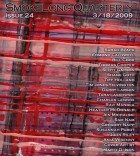My grandmother didn’t like fireworks much. She said they reminded her of the raids during the war, when everybody stayed in the tube tunnels at night, going in buckets and curling up on the tracks. When I was a little girl, these stories unnerved me as much as the raids did her. Whenever I rode the subway with my family, I worried that people were sleeping on the tracks, that we were just feet away from plowing into a twitching, dreamless body, grounding it into the rails like the possums we saw on the road in the country.
The tracks are electrified, my brother Jerry explained. They’d be dead the minute they set foot on them, anyway.
I also worried about people who died before they died. Like my grandmother, who seemed to be a body waiting for a train to finish the job. I watched her as she harvested radishes in the emerald city of our backyard, her face hidden by a large hat, her body straight and solid.
She grew radishes we never ate. She cleaned them until they gleamed, the ugly, forgotten cousins on the counter, where they sat next to the greasy brown paper bags containing Chinese or Thai or whatever Mom had picked up on her way home. And then, after a time, those radishes would disappear, replaced by new, hopeful, equally ugly ones that never got asked to dance.
We had a pretty good view of the fireworks at Rock Creek Park from our yard, but my grandmother never joined us. She would take a half-eaten sausage, the bounty from my father’s annual grilling duties, and watch them, in safety, on the television from her bedroom. Sometimes I’d creep over to her window and watch the lights fill the space in which she sat, nursing her sausage like a baby.
Grammy’s watching D-day, Jerry said, throwing some of her unpicked radishes at the squirrels in the same dark, aged trees that used to scare him at night years ago. Look out for the Messerschmitt.
Most of the information about the war and Britain during 1940 I got from my brother, who did a report for his history class. Grandma had told him about gathering blankets and her younger sibling and spending the night at the station in King’s Crossing. The rumblings above sounded like a thunderstorm. People played cards, spread out as much as the crowded conditions in the station allowed, and didn’t pay much attention to what was happening above, although it was unavoidable. One morning she had seen a dead woman. Her mother and sisters trudged back to the house, wondering whether they would have school that day, whether it was still there, when they saw her. She was draped over a big tree branch like an old doll, like someone had thrown her.
Some other women were laughing about the dead woman’s roots, Jerry said. I guess she bit it before she could get to the hairdresser.
I imagined a dead woman along my route to the bus stop in the mornings. Lying in the parking lot of the 7-11, people going about their business, maybe pushing her out of a needed parking space. In the trees by my school. I waited for her to open her eyes and laugh at me, bite my arm off with her bloodied teeth. I wondered if she lived in my grandmother’s dreams the way she lived in mine. I began sleeping in my grandmother’s room, on the divan. She would wake, her hair wrapped in curlers, and put a blanket over me.
I’m scared of the dead lady with the roots, I explained to her after it had gone on for a week and she threatened to tell my mother.
What lady with the roots?
The one that died during the raids.
You’re too young to think of such things, she said, finally, and I wondered where she would die. Would it be in this bed, with her curlers still in? I told Jerry not to talk about these things to you.
I could hear my mother yelling at Jerry the next afternoon. And she made me an appointment with a doctor.
A talking doctor, a psychiatrist, she explained. I wondered when my mother had learned about the lady with the roots. It’s nothing to worry about. Dr. Kazmir is going to help you get over those bad dreams.
But I didn’t see how it was possible. When the time came to go visit Dr. Kazmir, I hid in my grandmother’s room. She was at one of her ladies’ clubs. I crawled under her bed and listened to my mother’s quick, quiet steps, then my father’s more thunderous ones, vibrating the floor. I scanned the expanse of space underneath the bed and realized I was not alone. Three or four radishes from earlier in the week, their best days behind them, were nestled in a dishtowel, awaiting proper burial. After a while I picked one out, began chewing.



 A SmokeLong Summer 24!
A SmokeLong Summer 24!